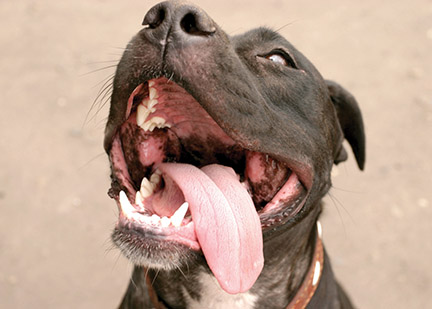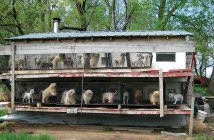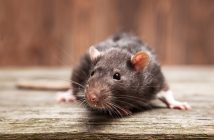It’s possible that no other dog breed in American history has experienced such a polarity in public perception as Pit Bulls. In the past 30 years, media reports of Pit Bull attacks have fueled reactions from fear to outrage, causing many to support their communities banning the breed. During the same time, Pit Bull owners and proponents have come together to tout the loving and loyal nature of Pit Bulls, working to help them beat the bad rep and improve their public image. But the Pit Bull hasn’t always had this polarized perception, and each dog’s history and temperament influence whether or not a Pit Bull is right for you.
Solid Standards
While Pit Bulls come in a variety of coat colors and patterns, their body shapes make them fairly easy to spot. They’re generally medium-sized dogs with short hair, and you can tell them from other similarly sized dogs because they are muscular and solidly built, with a broad head and wide muzzle. A Pit Bull’s body is slightly longer than it is tall, and their ears are medium length and set high on their heads. They are strong, athletic dogs.
Breed Background
Contrary to recent perception, the Pit Bull used to be universally beloved in America. In the early 20th century, their image was one of the faithful companion, as Americans saw Pete, the Pit Bull companion to President Theodore Roosevelt, and Petey, the adorable Pit Bull sidekick to the Little Rascals.
Whether they’ve been beloved or feared, their history is clear. According to the ASPCA, the modern American Pit Bull Terrier is “a descendent of the English bull-baiting dog — a dog that was bred to bite and hold bulls, bears and other large animals around the face and head.” This breed was large and slow but strong.
When baiting large animals was outlawed in the 1800s, people began breeding English bull-baiting dogs with smaller, fast terriers to produce a strong but more agile dog to fight against other dogs.
Because they are muscular and look tough and sometimes imposing, Pit Bulls are still purchased as status symbols and guard dogs today.
Temperament Tallies
But genetics aren’t everything. Despite being bred to fight originally, Pit Bulls are often described as sweet, gentle, loyal and loving — and even playful and silly.
“Pit Bulls offer unconditional love, loyalty, and dedication to you,” says Kelly Lawson, owner of five Pit Bull Terriers, one of which is Kandie, a therapy dog. “Each dog has its own personality, and it’s tapping into those personalities that make and shape their temperament.”
The ASPCA agrees with Kelly. “Genetics do not exist in a vacuum,” the organization says. “Rather, behavior develops through a complex interaction between environment and genetics. This is why there is such variation in behavior between individual dogs, even when they are of the same breed and bred for the same purpose. The Pit Bull specifically bred for generations to be aggressive may not fight with dogs and the Labrador retriever bred to be a service dog may be aggressive toward people.”
Due to their mixed public perception, however, people often approach Pit Bulls with fear, but Kelly encourages people to do the opposite. “Approach a Pit Bull with openness and get to know the individual dog,” she says, “Meet one before you judge.”
Indeed, many people are surprised to know that Kandie isn’t the exception to the rule when it comes to Pit Bulls being therapy animals — Pit Bulls actually comprise a high percentage of the therapy animal population. So, they are very capable of being gentle, friendly, and comforting.
Because they are energetic dogs, a Pit Bull wouldn’t be a good fit with a couch potato family. “They can act out and become destructive to your property if they don’t get exercise and keep their minds active,” Kelly says. “Basic obedience classes help keep their energy focused too.” So if you’re considering adding a Pit Bull as a family member, be prepared for their energetic natures.
Pit Bulls can be amazing animal companions for your family, if you know how to meet their needs. Before adopting one into your family, visit the SL County Pit Crew, a division of Salt Lake County Animal Services that offers education and resources to promote responsible pet ownership.




